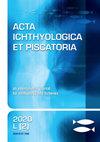Information source preferences of small-scale fishers in the Aegean Sea coast of Turkey
IF 1
4区 农林科学
Q3 FISHERIES
引用次数: 2
Abstract
Information source preferences of small-scale fishers can play a role in decision-making processes and affect the sustainability of smallscale fisheries. In this respect, determining useful communication tools to eliminate the information gaps and lack of information of fishers is important for sustainable and effective fisheries management. The purpose of this study was the determination of the preferred source of information and priorities of the small-scale fishers who operate along the Aegean Sea coast of Turkey. Data were collected from a random sample of 278 small-scale Turkish fishers located along the Aegean coastline via face-to-face interviews. Information source preferences of fishers were determined by Repertory Grid Technique. In the analysis, obtaining information about fisheries focused on three criteria such as marine ecology, fisheries technology, and fisheries policies. The level of importance given by fishers for each criterion was determined. Fishers prefer to get information from other fishers, followed by fishery cooperatives, and their own experiences (χ2 (11, n = 278) = 1305.920, P < 0.001). Fishery cooperatives are the closest organizations to fishers. The use of cooperatives as a source of information can be interpreted as an element that can facilitate access to information when evaluated through the “availability” of behavioral economics. Fishery cooperatives, which stand out in fishers’ information source preferences, have the potential to be a valuable source of information in all aspects. The results of the research are thought to benefit researchers from non-governmental organizations, research institutes, and universities that carry out national and international projects with fishers.土耳其爱琴海沿岸小规模渔民的信息来源偏好
小规模渔民的信息来源偏好可以在决策过程中发挥作用,并影响小规模渔业的可持续性。在这方面,确定有用的沟通工具以消除渔民的信息差距和信息缺乏,对于可持续和有效的渔业管理至关重要。本研究的目的是确定土耳其爱琴海沿岸小规模渔民的首选信息来源和优先事项。数据是通过面对面访谈从爱琴海海岸线278名土耳其小规模渔民的随机样本中收集的。渔民的信息源偏好由汇辑网格技术决定。在分析中,获取渔业信息的重点是三个标准,如海洋生态学、渔业技术和渔业政策。确定了渔民对每项标准的重视程度。渔民更喜欢从其他渔民那里获得信息,其次是渔业合作社,以及他们自己的经验(χ2(11,n=278)=1305.920,P<0.001)。渔业合作社是最接近渔民的组织。使用合作社作为信息来源可以被解释为一种因素,当通过行为经济学的“可用性”进行评估时,可以促进获取信息。渔业合作社在渔民的信息来源偏好中脱颖而出,有潜力成为各方面有价值的信息来源。这项研究的结果被认为有利于非政府组织、研究机构和大学的研究人员,他们与渔民一起开展国家和国际项目。
本文章由计算机程序翻译,如有差异,请以英文原文为准。
求助全文
约1分钟内获得全文
求助全文
来源期刊

Acta Ichthyologica Et Piscatoria
FISHERIES-ZOOLOGY
CiteScore
2.20
自引率
0.00%
发文量
31
审稿时长
>12 weeks
期刊介绍:
ACTA ICHTHYOLOGICA ET PISCATORIA (AIeP) is an international, peer-reviewed scientific journal that publishes articles based on original experimental data or experimental methods, or new analyses of already existing data, in any aspect of ichthyology and fisheries (fin-fish only).
 求助内容:
求助内容: 应助结果提醒方式:
应助结果提醒方式:


